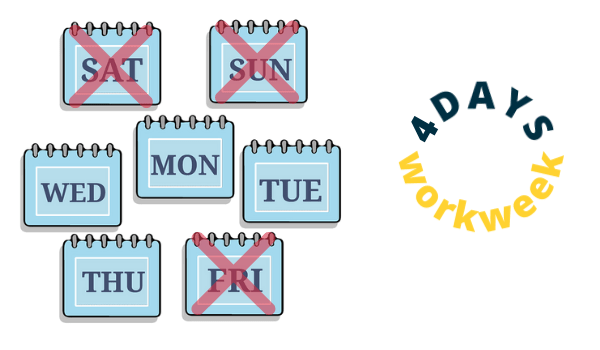When the Seattle startup Uplevel switched to a four-day week in January, the company was betting that its workers could do the same amount of work in less time.
Jori Maurer, vice president of marketing and people at Uplevel, said, “We wanted to see if fewer working days would make people more productive.”


The experiment went better than expected. According to an internal report, during the three-month trial period, the company delivered more products and signed up more customers than ever before. No worker said they wanted to go back to a five-day week. A four-day workweek is still in place at the company.
The results at Uplevel, which, appropriately, wants to help companies reach their goals without burning out their engineers, match the results of a global study that came out last month. The study polled over 900 employees from 33 companies that participated in a pilot program run by the non-profit 4 Day Week Global.
Overall, the study found that a shorter workweek was great for people’s mental and physical health, and it didn’t hurt employers in any significant way. In fact, the average revenue of the companies that took part went up 38% compared to the same time last year. The results add to the growing number of case studies that show how a shorter work week can be helpful.
We talked to Uplevel and another Seattle startup, Volt Athletics, to find out more about the pros and cons of a 4-day work week.
More efficiency
Dan Giuliani, the CEO of the fitness app startup Volt, said that when the company switched to a four-day week in July 2020, meeting times had to be cut back severely.
He told GeekWire, “We took every recurring meeting off the calendar and only put back the ones we thought were important.”
About a third of these meetings never made it back on the schedule, and they were more careful about who should attend the ones that did. In the meantime, the company asked employees to fill out surveys about how productive they thought they were.
Giuliani said, “What we found very consistently was that productivity at all levels was about the same, if not a little bit better.” He also said that there was a big increase in how happy, healthy, and satisfied employees were.
Getting good people
A four-day week can help smaller companies stay competitive when it comes to hiring and keeping employees.
“We have to be able to compete with the big guys,” Giuliani said. “This helps us get people who are looking for a mix of things, like a good work/life balance and a good way to live.”
Maurer said that the number of job applicants increased by a factor of ten after the shorter week was put into place.
70% of people who answered the global survey by 4 Day Week Global said that their next job would have to pay 10% to 50% more for them to go back to a five-day schedule. More than 10% said that no amount of money could make them go back. Qualtrics surveyed more than 1,000 people for a report that came out in February. The report found that 94% of U.S. employees would agree with their employer switching to a four-day work week.
Problems with customer service
When people say they don’t want to drop a work day, one of the most common reasons is that they want to keep good customer service. In the Qualtrics survey, more than half of employees (55%) said that closing for a day would likely make customers upset.
Giuliani agreed that this is a tough situation. He said that Volt’s customer service team does answer questions over the weekend, but they don’t get a lot of them. The policy is to try to get back to customers within 24 to 48 hours, but it’s up to the employees to decide when they do so.
Every Friday, a few people from different departments at Uplevel are put “on call.” Also, since the pilot is over, the company has stressed again that if something is “business critical,” it’s expected that people will be available on Friday, even if they’re “on call.”
Is today really a bad one?
Even if it’s just a metaphor, “closing the office” isn’t a black-and-white thing when workers can access their devices 24/7 and may feel pressure to meet their metrics anyway.
Maurer said that many employees chose to work on Fridays. Some of them said they liked being able to do more “deep work” without being interrupted. Giuliani said that Volt’s employees often choose to work on their “off day,” which he doesn’t think is a bad thing.
“We called the policy “Flex Fridays” on purpose so that people would know they could do whatever they wanted with their time on that day,” he said. “A lot of people end up doing work, but they do it on their own time and don’t feel the stress and strain of being online and responsive.”
Mikaela Kiner, the founder, and CEO of Seattle-based HR consulting firm Reverb leads her team of about 75 employees and consultants in a slightly different way. Instead of making an official four-day policy, which her staff voted against, she has a rule that there are no meetings on Fridays, and it’s generally understood that Friday is a flexible day. The feedback from her team is that it’s more important to be flexible than to stick to a strict number of days.
One thing to keep in mind about the 4-day week’s study is that it was more focused on small businesses. Researchers at 4 Day Week Global are talking with bigger companies about putting out more pilots in 2023. Microsoft did try a 4-day work week in Japan and found that it made people more productive.




